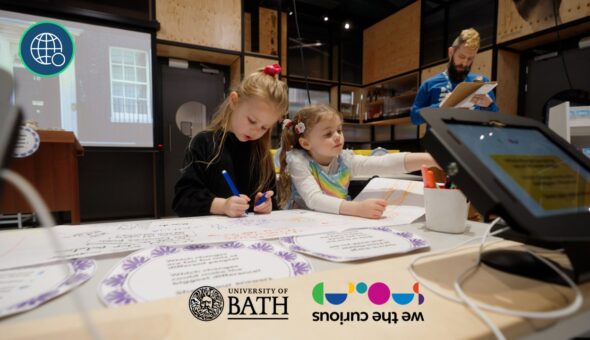As researchers, we are driven by curiosity and the pursuit of knowledge, but in today’s climate, we must also be driven by responsibility. The University of Bath’s commitment to the Concordat for the Environmental Sustainability of Research & Innovation Practice is a call to action: to embed sustainability into every step of our research practices.
This blog aims to showcase the efforts of researchers across our university who are already making strides in this direction and highlights some practical steps you can take to embed sustainable practices into your research.
Kind regards,
Sarah
Start with LEAF: A Framework for Greener Labs
Professor Petra Cameron from the Department of Chemistry has long been committed to sustainability through her research on solar cells. Her lab recently achieved a Bronze LEAF (Laboratory Efficiency Assessment Framework) award, a process she describes as a valuable first step for any lab looking to become more sustainable.
“The LEAF process makes you think critically about sustainability and energy use in the lab,” Petra explains. “It’s also a great way to start conversations within your team about how to reduce duplication and improve efficiency.”
Petra also champions low-carbon travel, with a group work travel policy that means they don't fly anywhere they can take the train and she is helping to look at ways the Institute of Sustainability and Climate Change (ISCC) can develop, implement and disseminate best practice in sustainable research, as Chair of the ISCC Sustainability Working Group.
Turning Up the Temperature to Turn Down Emissions
In the Department of Life Sciences, Professor Ed Feil has led a simple but impactful change: warming up ultra-low temperature (ULT) freezers from -80°C to -70°C. This adjustment can reduce energy consumption by up to 30%, without compromising sample integrity.
Ed’s initiative is part of a broader departmental effort to rethink energy use and promote sustainable lab practices, and it is great to see that the labs in the Milner Centre have recently achieve a Bronze LEAF accreditation.
Technicians Leading the Charge: Martin Levere
Martin Levere, Instrument Technician in Core Research Facilities (CRF), is a strong advocate for embedding sustainability into the operational heart of research. With the technical teams involvement, several labs in the CRF and the Department of Chemistry have achieved Silver LEAF accreditation.
The LEAF framework helps labs demonstrate how they’ve optimised waste disposal, reduced energy use, and embedded sustainable practices into staff inductions and day-to-day operations. By setting clear standards for communication, resource sharing, and recycling, labs can measurably reduce their carbon footprint, while also saving time and money.
LEAF laboratories are assessed by a team of auditors, many of which have their own laboratories within the scheme. Martin states that “it is certainly interesting looking around the range of different cross disciplinary settings in which scientific work is performed, such as chemistry, engineering and psychology.”
Examples of improved sustainable practice include designing chemical processes aligned with the “12 Principles of Green Chemistry,” optimising equipment purchasing and usage, and establishing protocols for staff training and departures. Martin notes that sustainability is increasingly important to research funders, and that the LEAF accreditation is an excellent way to demonstrate that best practice is being followed.
“The objective is part of a wider piece of work, ensuring all the laboratories across the University are as efficient and green as possible without compromising the functionality needed to make a positive impact with research,” he adds.
Starting the Journey: Julia Mackay
Julia Mackay, an Instrument Specialist in Core Research Facilities, is at the beginning of her LEAF journey, but she’s already making a meaningful impact. Motivated by the high energy costs and plastic waste in labs, Julia has taken several practical steps to reduce her lab’s environmental footprint.
“At home, I recycle everything I can. It didn’t sit right with me that uncontaminated plastic waste in the lab was going straight to general waste,” she says.
Julia has already raised her ULT freezer temperature from -80°C to -70°C, resulting in a 25–30% energy saving. She’s also vigilant about switching off equipment when not in use and only running energy-intensive devices like incubators and heat blocks when necessary.
“I’ve started sourcing second-hand equipment through UniGreenScheme. It’s cost-effective and keeps usable items out of landfill.”
Looking ahead, Julia plans to implement a lab plastic recycling system through LabCycle and is tapping into the LEAF Teams network for support and ideas.
“The LEAF training was incredibly informative. I’d encourage anyone interested in sustainability to attend and connect with others through the network. There’s a wealth of knowledge and support available.”
What Can You Do Today?
If you’re wondering where to begin, here are a few simple actions to consider:
- Access the new Sustainable Research Hub for guidance and resources to help you get started
- Explore LEAF accreditation for your lab or research space.
- Review your energy use—can equipment be turned off or run more efficiently?
- Travel smart—opt for trains over planes where possible.
- Recycle and reuse—from plastics to lab equipment, small changes add up.
- Join the conversation—connect with the LEAF network on Microsoft Teams or get in touch with the Sustainability Team to find out more.
Sustainability in research isn’t about perfection—it’s about progress. As Petra Cameron puts it: “Start small and keep going.”
Find out more on our University sustainable research hub.



